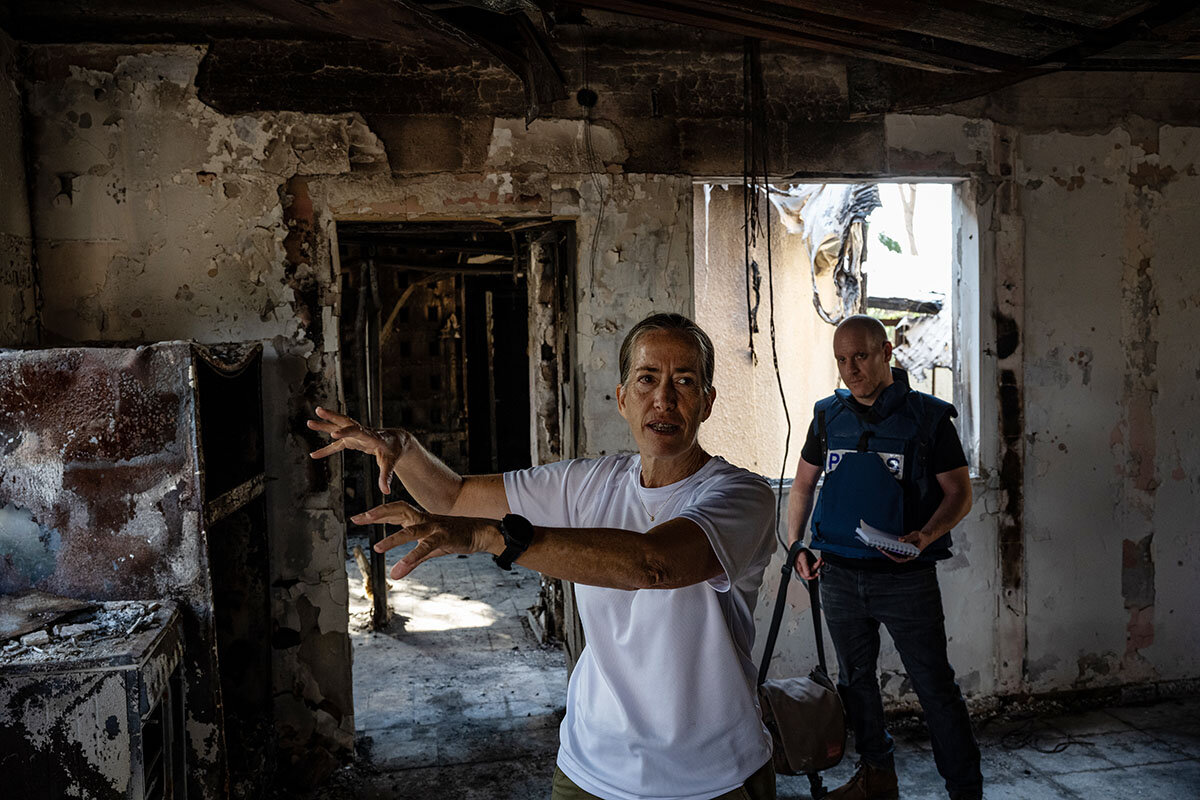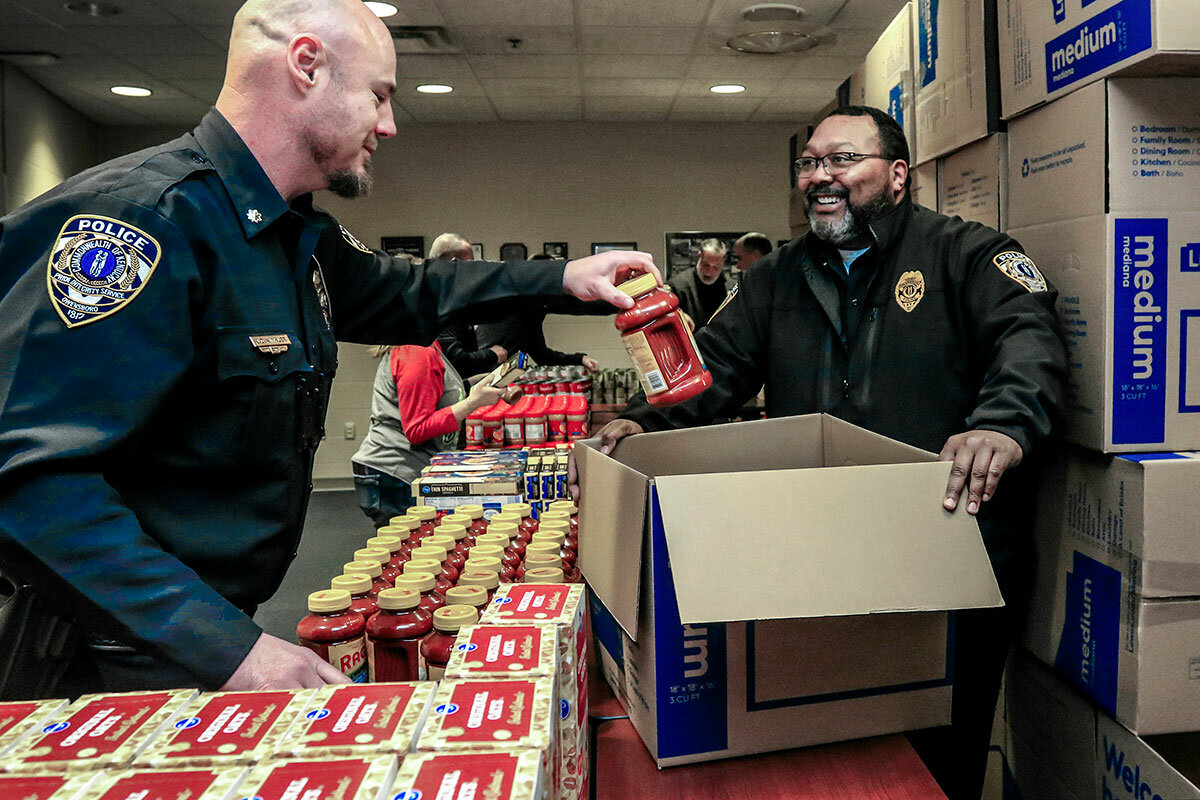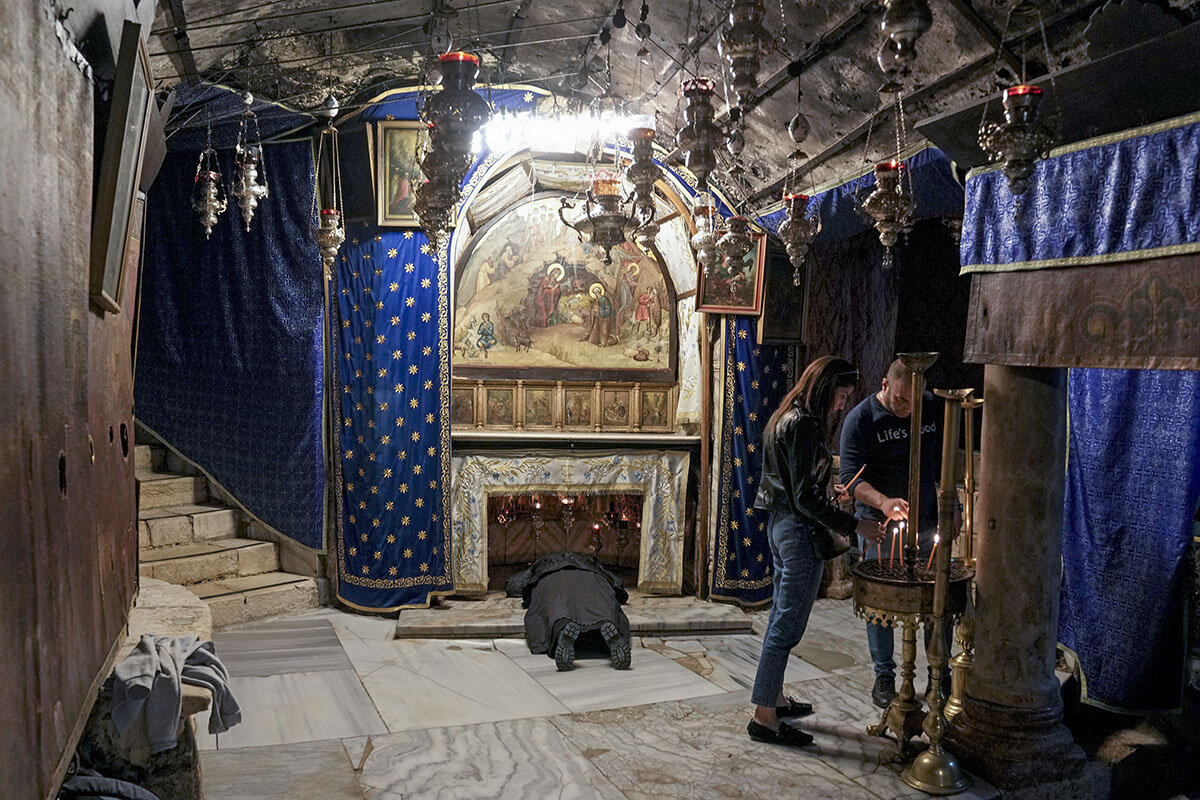The scene at a border kibbutz that was overrun by Hamas Oct. 7 shows the enduring physical and human damage from an attack that changed Israel, launched a brutal war, and deepened the challenge of achieving peaceful coexistence.

Why is Christian Science in our name?
Our name is about honesty. The Monitor is owned by The Christian Science Church, and we’ve always been transparent about that.
The Church publishes the Monitor because it sees good journalism as vital to progress in the world. Since 1908, we’ve aimed “to injure no man, but to bless all mankind,” as our founder, Mary Baker Eddy, put it.
Here, you’ll find award-winning journalism not driven by commercial influences – a news organization that takes seriously its mission to uplift the world by seeking solutions and finding reasons for credible hope.
Explore values journalism About usMonitor Daily Podcast
- Follow us:
- Apple Podcasts
- Spotify
- RSS Feed
- Download
 Mark Sappenfield
Mark Sappenfield
Today, Harry Bruinius cuts to the core of the debate over Catholic priests blessing same-sex couples. Should the church prioritize doctrinal purity or pastoral care? But that deeper debate goes well beyond this topic, or even religion.
Today’s Daily also takes on immigration. Is that not about law and order versus care – a variant of the same debate? There’s also a story about banning a new strain of violent music in a Mexico town – order versus understanding. So much of politics is about this precise dynamic.
This is polarization – not policy positions, but the inflexible certainty that the answer is in one approach or the other, not in earnestly seeking the best blend of both.
Already a subscriber? Log in
Help fund Monitor journalism for $11/ month
Monitor journalism changes lives because we open that too-small box that most people think they live in. We believe news can and should expand a sense of identity and possibility beyond narrow conventional expectations.
Our work isn't possible without your support.
Today’s stories
And why we wrote them

( 7 min. read )
( 4 min. read )
Palestinian Christians are putting Christmas festivities on hold, focusing their attention on family and friends in danger and praying for the return of peace.
( 5 min. read )
During his 10 years as head of the Catholic Church, Pope Francis has placed an emphasis on charity over doctrine. This week’s ruling on blessings, experts say, shows efforts to extend a larger welcome.
Patterns
( 4 min. read )
If you can’t beat ’em, join ’em? Traditionally moderate, conservative European parties are adopting anti-immigration policies in hopes of boosting their appeal to far-right populists, whose numbers are growing.
( 5 min. read )
Residents of the Italian island of Lampedusa regularly see their lives and livelihoods unsettled by Europe’s struggle with unauthorized migration. But they maintain a desire to help those crossing the Mediterranean.
( 5 min. read )
Politicians have often tried to ban pop culture that they claim glorifies violence. Tijuana is the latest to try it. Do those bans affect safety?
The Monitor's View
( 2 min. read )
Worried that Americans are marching into an election year more divided than ever? Take another look.
In October, a first-ever Connection Index offered a striking counternarrative. Conducted by The Harris Poll, it found that 76% of Americans see the good in those they disagree with and 71% have friends who hold views they don’t share.
Those attitudes may reflect something more than mere personal affection. A new survey of American spirituality reveals a deeper basis of thought binding society together. Published by the Pew Research Center this month, the study asked more than 11,000 Americans how they thought about spirituality. It found a recurring theme of connectedness.
For example, 74% described “being connected with something bigger than myself” as an essential quality of spirituality. Seventy percent said the same about “being connected with God,” while 64% said “being connected with my ‘true self’” and 54% said “being open-minded” were essential to spirituality. Nearly 4 in 10 said spirituality involved “being connected with other people.”
Overall, the survey found, 9 in 10 Americans believe in God or a power higher than themselves, 70% describe themselves as spiritual, and 53% expressed a “deep sense of connection with humanity.” These views were drawn from across multiple demographic and denominational boundaries.
For years, medical practitioners have been gathering evidence that spirituality is a vital factor in health. Some 90% of medical schools in the United States, 59% in Britain, and 52% in German-speaking countries now include spiritual studies in their curricula. As the Pew study notes, society is drawing new distinctions between being spiritual and being religious. Doctors and nurses incorporating spirituality in health care often start with the simple act of listening.
“When I think of spirituality in health care, it’s the connection we make with other people,” Diana Veneri, an associate professor of physical therapy at Sacred Heart University in Connecticut, told a public forum in July. Such empathy and compassion promote healing by alleviating fear and affirming a sense of individual worth, medical studies have shown.
They have a similar effect on society as a whole. “Social connectedness influences our minds, bodies, and behaviors – all of which influence our health and life expectancy,” the Centers for Disease Control and Prevention concluded in a March study. “Inclusive connections in our neighborhoods, schools, places of worship, workplaces, and other settings are associated with ... and support the overall well-being, health, safety, and resilience of communities.”
For one respondent in the Pew study, spirituality meant being able to “see the beauty in everything, feel the love of Mother Nature, to know that there is something out there that is greater than me, that loves me, that looks out for me.” That kind of seeing good may be the reason behind the Connection Index finding that Americans don’t need to agree in order to get along.
A Christian Science Perspective
Each weekday, the Monitor includes one clearly labeled religious article offering spiritual insight on contemporary issues, including the news. The publication – in its various forms – is produced for anyone who cares about the progress of the human endeavor around the world and seeks news reported with compassion, intelligence, and an essentially constructive lens. For many, that caring has religious roots. For many, it does not. The Monitor has always embraced both audiences. The Monitor is owned by a church – The First Church of Christ, Scientist, in Boston – whose founder was concerned with both the state of the world and the quality of available news.
( 3 min. read )
As we open our hearts to Christ’s message of truth, we see more of our inherent harmony as the spiritual children of God.
Viewfinder

A look ahead
Thank you for joining us today. Please come back tomorrow for a special holiday treat. We look at the meaning of home from the prairies of Montana to a war-torn apartment in Chechnya. It’s a wonderful way to bring a bit more love and joy to wherever you happen to be in the coming days.








